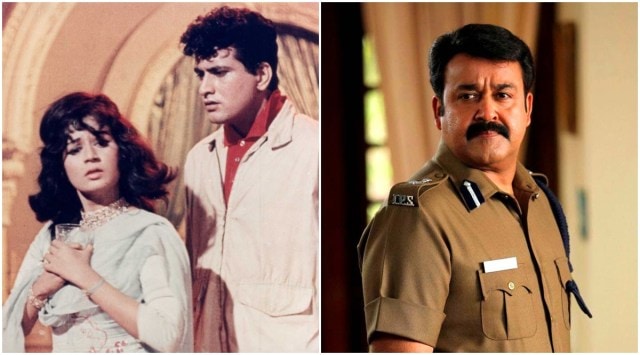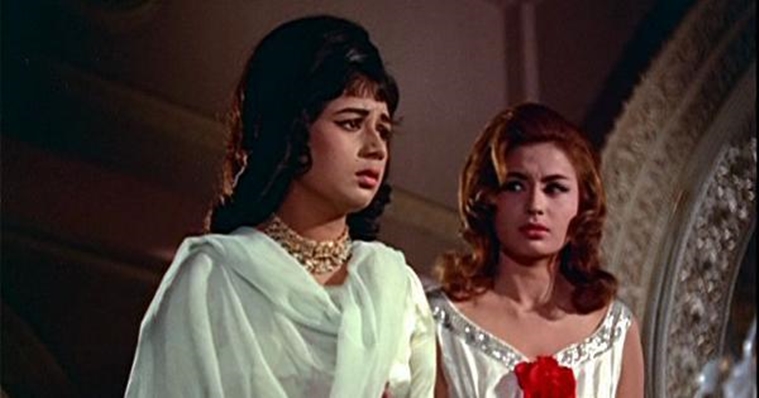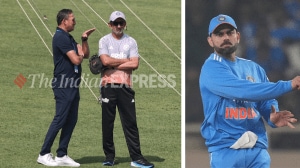Click here to follow Screen Digital on YouTube and stay updated with the latest from the world of cinema.
A brief history of Agatha Christie’s (mostly uncredited) Indian adaptations: Gumnaam, Shubho Mahurat, and Grandmaster
Right from the 60s, Indian filmmakers have taken plots from Agatha Christie's books and set them in Indian contexts, mostly without crediting her. Here is a brief history.
 Which is your favourite Indian Agatha Christie adaptation?
Which is your favourite Indian Agatha Christie adaptation?Kenneth Branagh’s Death on the Nile is a follow-up to his own 2017 film, Murder on the Orient Express, the second in a series of his Agatha Christie adaptations. The film, like the earlier film, has a stacked cast with names like Annette Bening, Russell Brand, Ali Fazal, Dawn French, Gal Gadot, Armie Hammer, Rose Leslie, Emma Mackey, Sophie Okonedo, Jennifer Saunders, and Letitia Wright.
Thus far, it has received positive reviews. It is rated 67 per cent on Rotten Tomatoes. The critical consensus reads, “Old-fashioned to a fault, the solidly entertaining Death on the Nile is enlivened by its all-star cast and director-star Kenneth Branagh’s obvious affection for the material.”
The late Agatha Christie, dubbed the Queen of Crime or Queen of Mystery, was an astonishingly prolific author and along with William Shakespeare is the most sold author of all time with 2 to 4 billion sales as per The Times.
Her books, And Then There Were None and The A.B.C. Murders (apart from the two already adapted by Branagh and screenwriter Michael Green) are the first names when it comes to 20th century detective fiction.
Her whodunits, crime fiction novels and other books have been adapted to screen and theatre countless times. The sleuth characters she created like Hercule Poirot and Miss Marple are up there with Sherlock Holmes in the most popular fictional detectives.
It is not surprising, then, to learn of Indian adaptations of her works. Right from the 60s, Indian filmmakers have taken plots from the Dame’s books and set them in Indian contexts — mostly without crediting her.
Here is a brief history:
Chupi Chupi Aashey (1960)
Like many things in the arts, Bengalis were the first to adapt one of Christie’s works. Premendra Mitra’s 1960 Bengali murder mystery film called Chupi Chupi Aashey was based on a stage play The Mousetrap. Starring Tapati Ghosh, Robin Majumdar, and Tarun Kumar, Chupi Chupi Aashey (meaning He Comes in Stealth) was about the murder of a woman. A hand bill of a hotel drops out of the pocket of the perpetrator. The hotel in question, run by a couple, has multiple guests, checked in under false names. Sudden floods strands them in hotel. Murder mystery ensues.
Gumnaam (1965)
 A still from Gumnaam.
A still from Gumnaam.
Gumnaam was the second Indian and the first Hindi film to take plot from one of Christie’s mysteries — And Then There Were None this time. Like Chupi Chupi Aashey, the ‘inspiration’ was never mentioned. Starring big names like Manoj Kumar, Nanda, Pran, Helen and Mehmood, Gumnaam did differ significantly in a few respects.
For instance, unlike the ten people stranded on the island, there are seven guests here. requisite song and dance routines, including the “Hum Kaale Hain To” song featuring Mehmood. The recently departed Lata Mangeshkar’s “Gumnaam Hai Koi” was another memorable song. In a typical Hindi film fashion, the edges of the source material were blunted to make it more palatable and less darker for the audiences.
Nadu Iravil (1970)
The S Balachander directorial Nadu Iravil followed Gumnaam’s lead and was also an adaptation of And Then There Were None. But there was no island here, just a big house. For somebody familiar with the original story, the film was largely unremarkable.
Dhund (1973)
BR Chopra’s Dhund, released in 1973, was a truly solid thriller, and one of better Christie adaptations made in India. It had its source material as Christie’s 1958 play The Unexpected Guest. Featuring names like Sanjay Khan, Zeenat Aman, Danny Denzongpa, Deven Verma, Madan Puri, Navin Nischol and Ashok Kumar, the film was about a man (Navin Nischol) who enters a home to make a phone call after meeting with a car accident. He finds the man of the house (Danny Denzongpa) dead and a woman (Zeenat Aman) standing near the body and holding a gun. She claims she killed her husband as he was abusive. The two team up to save her from police. Long story short, it doesn’t go well.
Shubho Mahurat (2003)
 Rakhi and Shamila Tagore in Shubho Mahurat.
Rakhi and Shamila Tagore in Shubho Mahurat.
The iconic Bengali filmmaker Rituparno Ghosh took a stab at Christie in 2003 with Shubho Mahurat. It helped that a director of Ghosh’s calibre was at the project’s helm, for Shubho Mahurat, based on The Mirror Crack’d from Side to Side, is likely the best Indian Christie adaptation yet.
Boasting of names like Sharmila Tagore, Nandita Das and Rakhi, the story was about the death of an actor while giving an interview. It is up to the said journalist and her aunt to solve the mystery. Everybody from the ‘Shubho Mahurat’ celebrations is a suspect. A lovingly shot, acted and directed adaptation that honours the spirit of the original work.
Aduthathu and Aatagaram (2011 and 2015)
2011’s Tamil film Aduthathu was another Indian adaptation of And Then There Were None. Directed by Thakkali Srinivasan, the film featured Nassar, Sriman, Vaiyapuri, Ilavarasu, Aarthi and Meenal. 2015’s Kannada movie Aatagaram, featuring Chiranjeevi Sarja, Meghana Raj, Parul Yadav, Anu Prabhakar, among others, was interestingly accused of copying the plot of Aduthathu, and the director K M Chaitanya clarified that the confusion was natural for both movies shared a common source material.
Grandmaster (2012)
2012’s Malayalam film Grandmaster, featured superstar Mohanlal as IG (Inspector General) Chandrasekhar, who investigates a series of murders committed by a killer who calls himself Z. Based on Christie’s The A.B.C. Murders, the B. Unnikrishnan directorial, like the original novel, had the killer bumping off people in alphabetical order — like Alice, Beena Thomson and Chandrika Narayanan. It was a strictly decent adaptation, though Mohanlal’s star power worked against the movie for the script appeared to be more interested in him than solving the mystery.
Future
Most Indian adaptations of Christie’s works have suffered because of the story’s needless, let’s call it, Indianisation. Most have been a miss. The futures bodes well, though. Because after adapting many of William Shakespeare’s works, none other than Vishal Bhardwaj has set his eyes on Agatha Christie.
In a Times of India interview from 2020, he revealed that Agatha Christie Limited, the estate that manages the literary and media rights to the Dame’s works, had contacted him. He said he felt very honoured and fortunate that after Shakespeare, he will get to work on a project based on Christie’s work. However, he did not reveal whether he would adapt any specific work.


- 01
- 02
- 03
- 04
- 05
































